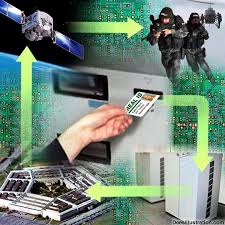Al-CIAeda may be planning to use a ‘dirty bomb’
February 2, 2011
Al-Qaeda is actively trying to secure nuclear material and recruiting rogue scientists to build a radioactive “dirty” bomb, according to leaked diplomatic documents revealed by Wikileaks.
Telegraph
January 2, 2011
A leading atomic regulator has privately warned that the world stands on the brink of a “nuclear 9/11″.
• The WikiLeaks cables in full
Security briefings suggest that jihadi groups are also close to producing “workable and efficient” biological and chemical weapons that could kill thousands if unleashed in attacks on the West.
Thousands of classified American cables obtained by the WikiLeaks website and passed to The Daily Telegraph detail the international struggle to stop the spread of weapons-grade nuclear, chemical and biological material around the globe.
At a Nato meeting in January 2009, security chiefs briefed member states that al-Qaeda was plotting a programme of “dirty radioactive IEDs”, makeshift nuclear roadside bombs that could be used against British troops in Afghanistan.
As well as causing a large explosion, a “dirty bomb” attack would contaminate the area for many years.
The briefings also state that al-Qaeda documents found in Afghanistan in 2007 revealed that “greater advances“ had been made in bio-terrorism than was previously realised.
An Indian national security adviser told American security personnel in June 2008 that terrorists had made a “manifest attempt to get fissile material” and “have the technical competence to manufacture an explosive device beyond a mere dirty bomb”.
Alerts about the smuggling of nuclear material, sent to Washington from foreign US embassies, document how criminal and terrorist gangs were trafficking large amounts of highly radioactive material across Europe, Africa and the Middle East.
The alerts explain how customs guards at remote border crossings used radiation alarms to identify and seize cargoes of uranium and plutonium.
Freight trains were found to be carrying weapons-grade nuclear material across the Kazakhstan-Russia border, highly enriched uranium was transported across Uganda by bus, and a “small-time hustler” in Lisbon offered to sell radioactive plates stolen from Chernobyl.
In one incident in September 2009, two employees at the Rossing Uranium Mine in Namibia smuggled almost half a ton of uranium concentrate powder – yellowcake – out of the compound in plastic bags.
“Acute safety and security concerns” were even raised in 2008 about the uranium and plutonium laboratory of the International Atomic Energy Agency (IAEA), the nuclear safety watchdog.
Tomihiro Taniguchi, the deputy director-general of the IAEA, has privately warned America that the world faces the threat of a “nuclear 9/11″ if stores of uranium and plutonium were not secured against terrorists .
But diplomats visiting the IAEA’s Austrian headquarters in April 2008 said that there was “no way to provide perimeter security” to its own laboratory because it has windows that leave it vulnerable to break-ins.
Senior British defence officials have raised “deep concerns” that a rogue scientist in the Pakistani nuclear programme “could gradually smuggle enough material out to make a weapon,” according to a document detailing official talks in London in February 2009.
Agricultural stores of deadly biological pathogens in Pakistan are also vulnerable to “extremists” who could use supplies of anthrax, foot and mouth disease and avian flu to develop lethal biological weapons.
Anthrax and other biological agents, including smallpox and avian flu, could be sprayed from a shop-bought aerosol can in a crowded area, leaked security briefings warn.
The security of the world’s only two declared smallpox stores in Atlanta, USA, and Novosibirsk, Russia, has repeatedly been called into doubt by “a growing chorus of voices” at meetings of the World Health Assembly documented in the leaked cables.
The alarming disclosures come after President Barack Obama last year declared nuclear terrorism “the single biggest threat” to international security with the potential to cause “extraordinary loss of life”.


